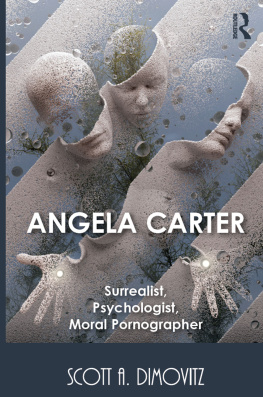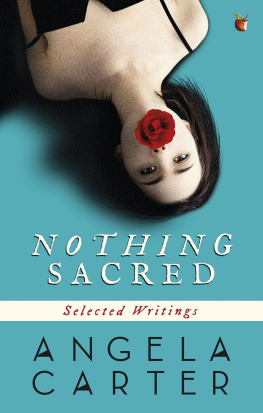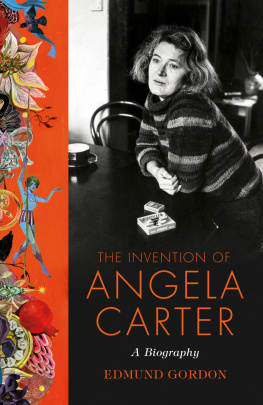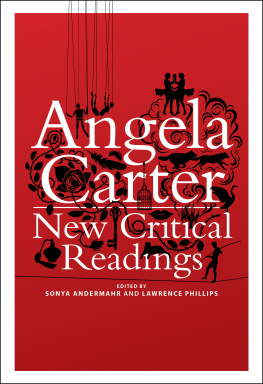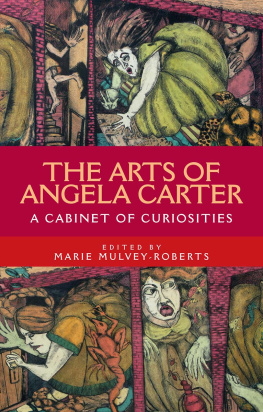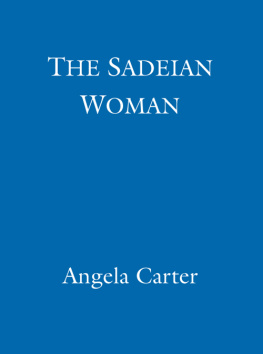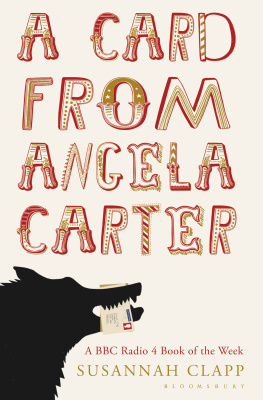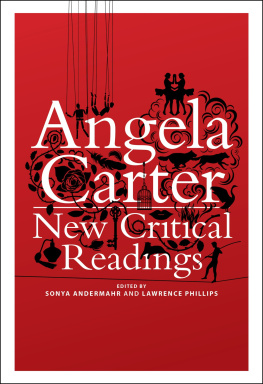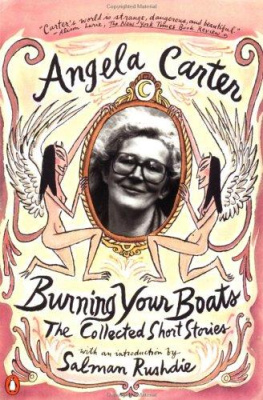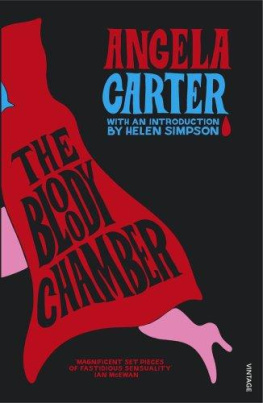Dimovitz - Angela Carter: Surrealist, Psychologist, Moral Pornographer
Here you can read online Dimovitz - Angela Carter: Surrealist, Psychologist, Moral Pornographer full text of the book (entire story) in english for free. Download pdf and epub, get meaning, cover and reviews about this ebook. publisher: Taylor and Francis, genre: Romance novel. Description of the work, (preface) as well as reviews are available. Best literature library LitArk.com created for fans of good reading and offers a wide selection of genres:
Romance novel
Science fiction
Adventure
Detective
Science
History
Home and family
Prose
Art
Politics
Computer
Non-fiction
Religion
Business
Children
Humor
Choose a favorite category and find really read worthwhile books. Enjoy immersion in the world of imagination, feel the emotions of the characters or learn something new for yourself, make an fascinating discovery.
- Book:Angela Carter: Surrealist, Psychologist, Moral Pornographer
- Author:
- Publisher:Taylor and Francis
- Genre:
- Rating:5 / 5
- Favourites:Add to favourites
- Your mark:
- 100
- 1
- 2
- 3
- 4
- 5
Angela Carter: Surrealist, Psychologist, Moral Pornographer: summary, description and annotation
We offer to read an annotation, description, summary or preface (depends on what the author of the book "Angela Carter: Surrealist, Psychologist, Moral Pornographer" wrote himself). If you haven't found the necessary information about the book — write in the comments, we will try to find it.
Dimovitz: author's other books
Who wrote Angela Carter: Surrealist, Psychologist, Moral Pornographer? Find out the surname, the name of the author of the book and a list of all author's works by series.
Angela Carter: Surrealist, Psychologist, Moral Pornographer — read online for free the complete book (whole text) full work
Below is the text of the book, divided by pages. System saving the place of the last page read, allows you to conveniently read the book "Angela Carter: Surrealist, Psychologist, Moral Pornographer" online for free, without having to search again every time where you left off. Put a bookmark, and you can go to the page where you finished reading at any time.
Font size:
Interval:
Bookmark:

ANGELA CARTER: SURREALIST, PSYCHOLOGIST, MORAL PORNOGRAPHER
Contributing to the conversation regarding Angela Carters problematic relationship with what she viewed as the interrelated traditions of surrealism and psychoanalysis, Scott Dimovitz explores the intricate connections between Carters private life and her public writing. He begins with Carters assertion that it was through her sexual and emotional life that she was radicalized, drawing extensively on the British Librarys recently archived collection of Carters private papers, journals, and letters to show how that radicalization happened and what it meant both for her worldview and for her writings. Through close textual analysis and a detailed study of her papers, Dimovitz analyzes the ways in which this second-wave feminists explorations of sexuality merged with her investigations into surrealism and psychoanalysis, an engagement that ultimately led to the explosively surreal allegories of Carters later, more complex, and more accomplished work. His study not only offers a new way to view Carters oeuvre, but also makes the case for the importance of Angela Carters vision in understanding the transformations in feminist thinking from the postwar to the postfeminist generation.
Scott A. Dimovitz is Associate Professor of English at Regis University, USA.
Angela Carter: Surrealist, Psychologist, Moral Pornographer
SCOTT A. DIMOVITZ
Regis University, USA

First published 2016
by Routledge
2 Park Square, Milton Park, Abingdon, Oxon OX14 4RN
and by Routledge
711 Third Avenue, New York, NY 10017
Routledge is an imprint of the Taylor & Francis Group, an informa business
2016 Scott A. Dimovitz
The right of Scott A. Dimovitz to be identified as author of this work has been asserted by him in accordance with sections 77 and 78 of the Copyright, Designs and Patents Act 1988.
All rights reserved. No part of this book may be reprinted or reproduced or utilised in any form or by any electronic, mechanical, or other means, now known or hereafter invented, including photocopying and recording, or in any information storage or retrieval system, without permission in writing from the publishers.
Trademark notice: Product or corporate names may be trademarks or registered trademarks, and are used only for identification and explanation without intent to infringe.
British Library Cataloguing in Publication Data
A catalogue record for this book is available from the British Library
Library of Congress Cataloging in Publication Data
Names: Dimovitz, Scott A.
Title: Angela Carter: surrealist, psychologist, moral pornographer / by Scott A. Dimovitz.
Description: Farnham, Surrey, England; Burlington, VT: Ashgate, [2016] | Includes index.
Identifiers: LCCN 2015033475 | ISBN 9781472469663 (hardcover) |
ISBN 9781472469670 (ebook) | ISBN 9781472469687 (epub)
Subjects: LCSH: Carter, Angela, 19401992Criticism and interpretation.
Classification: LCC PR6053.A73 Z5855 2012 | DDC 823/.914dc23
LC record available at http://lccn.loc.gov/2015033475
ISBN: 9781472469663 (hbk)
ISBN: 9781472469670 (ebk PDF)
ISBN: 9781472469687 (ebk ePUB)
Typeset in Times New Roman
by Apex CoVantage, LLC
To Angela Carter, for all of this, and
To Lara Narcisi, for everything else.
Contents
This project is almost 20 years in the making, since I was first introduced to Angela Carters The Passion of New Eve in a graduate seminar with Philip Brian Harper at New York University. If it were not for that first exposure to that most original text, I might not have undertaken the extensively researched project herein. Sections of the original argument about Carters relationship to surrealism and psychoanalysis formed part of my dissertation, Subverting Subversion: Contrapostmodernism and Contemporary Fictions Challenge to Theory, which was directed by the always insightful Josephine Gattuso Hendin.
At Regis University in Denver, Colorado, there are many people and institutions to acknowledge, including Regis itself for the sabbatical time and for the multiple research grants from the Faculty Development Committee and Sponsored Projects Academic Research Council (SPARC), both of which I received over three summers to travel to London to access the Angela Carter Papers at the British Library, which also needs acknowledgement. Thanks also to the countless colleagues and students with whom I have discussed Carters works, especially Troy Thibodeaux, Robert Jackson, Olivia Tracy, and my entire English department. Thanks also to Regis Universitys librarians Martin Garner, Paul Betty, and Tom Reidel, who helped to negotiate some of the labyrinthine international copyright issues entailed by a study of this scope.
This book expands upon three previously published articles from different journals, each of which needs acknowledgement. I was the subject of the sentence written on the mirror. Angela Carters Short Fiction and the Unwriting of the Psychoanalytic Subject appeared in Lit: Literature Interpretation Theory 21.1 (2010), Taylor & Francis/Society, available online at: http://www.tandfonline.com/toc/glit20/21/1. Angela Carters Narrative Chiasmus: The Infernal Desire Machines of Doctor Hoffman and The Passion of New Eve appeared in Genre (2009), presently published by Duke University Press. Cartesian Nuts: Rewriting the Platonic Androgyne in Angela Carters Japanese Surrealism appeared in FEMSPEC: An Interdisciplinary Feminist Journal 6.2 (2005), Batya Weinbaum.
And thanks finally to Lara Narcisi for the love, encouragement, intellect, and brilliant conversations that inspire me every day.
Angela Carters brand of feminist fiction continues to trouble the margins of contemporary feminist discourse. Since her early death in 1992, Carters reputation has grown as one of Britains most significant second-wave feminist writers, ranking at number 10 on the Timess 2008 list of The 50 Greatest British Writers Since 1945, yet readers often have difficulty seeing her relation to more obvious feminist traditions. This is especially true in America, where Carter cannot seem to attain the clear canonization she has begun to have in Europe. Some of this difficulty arises from the fact that Carters works are notoriously difficult, and critics have often attacked her densely antirealist bravura because, in part, they have no idea what is going on. This led Carter to defend her style against a constant marginalization by the literary establishment, as when she declared right before her death in 1992 to Kim Evans in the BBC2 program, Angela Carters Curious Room: I mean, Im an arty person, o.k.? I write overblown, purple, self-indulgent proseso fucking what? Unlike the social realism of classic writers such as Kate Chopin and George Eliot, the overtly polemical works of bell hooks and Arundhati Roy, or the more recognizable fables of Jeannette Winterson and Margaret Atwood, Carters works are often architectonic allegories, descending from the high modernist tradition of James Joyce, T.S. Eliot, and Ezra Pounderudite intellectuals who were deeply concerned with developing a comprehensive worldview and putting it all into the work. In the postwar literary scene, that kind of flamboyant intellectualism contradicted the dominance of domestic realist writing among literary fiction writers, which reasserted itself aggressively to refute the maximalist tendencies of postmodern playfulness, and which has tended to favor the stark minimalism of Ann Beattie and Raymond Carver. Aside from the occasional metafictional play, however, Carter shared very little with the leading practitioners of such fully developed postmodernism like John Barth, Donald Barthelme, and Robert Coover, so publishers and reviewers found her works difficult to market in any easy way. Similarly, readers approaching Carters works can feel bewildered by the complexity of her allegorical technique and her often highly idiosyncratic intellectual interests, leading them to appreciate the erudition without understanding her larger project.
Next pageFont size:
Interval:
Bookmark:
Similar books «Angela Carter: Surrealist, Psychologist, Moral Pornographer»
Look at similar books to Angela Carter: Surrealist, Psychologist, Moral Pornographer. We have selected literature similar in name and meaning in the hope of providing readers with more options to find new, interesting, not yet read works.
Discussion, reviews of the book Angela Carter: Surrealist, Psychologist, Moral Pornographer and just readers' own opinions. Leave your comments, write what you think about the work, its meaning or the main characters. Specify what exactly you liked and what you didn't like, and why you think so.

